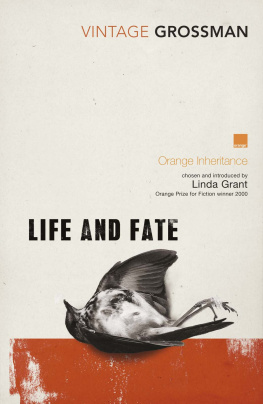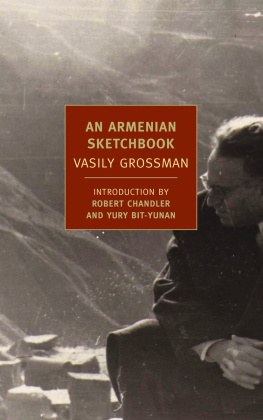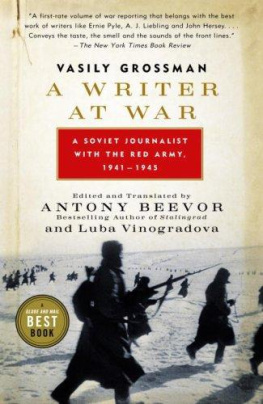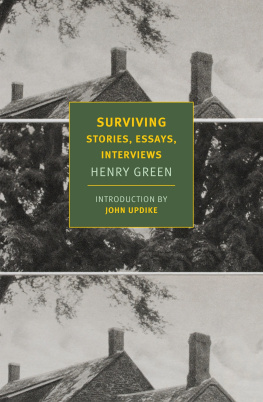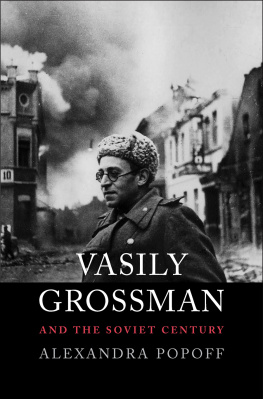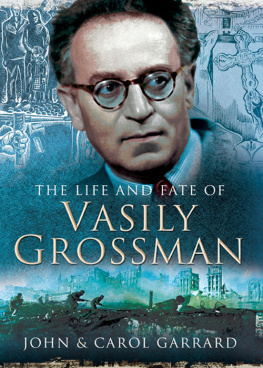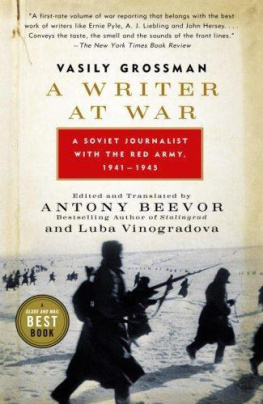Vasily Grossman - The Road: Stories, Journalism, and Essays (New York Review Books Classics)
Here you can read online Vasily Grossman - The Road: Stories, Journalism, and Essays (New York Review Books Classics) full text of the book (entire story) in english for free. Download pdf and epub, get meaning, cover and reviews about this ebook. year: 2010, publisher: NYRB Classics, genre: Science. Description of the work, (preface) as well as reviews are available. Best literature library LitArk.com created for fans of good reading and offers a wide selection of genres:
Romance novel
Science fiction
Adventure
Detective
Science
History
Home and family
Prose
Art
Politics
Computer
Non-fiction
Religion
Business
Children
Humor
Choose a favorite category and find really read worthwhile books. Enjoy immersion in the world of imagination, feel the emotions of the characters or learn something new for yourself, make an fascinating discovery.

- Book:The Road: Stories, Journalism, and Essays (New York Review Books Classics)
- Author:
- Publisher:NYRB Classics
- Genre:
- Year:2010
- Rating:5 / 5
- Favourites:Add to favourites
- Your mark:
- 100
- 1
- 2
- 3
- 4
- 5
The Road: Stories, Journalism, and Essays (New York Review Books Classics): summary, description and annotation
We offer to read an annotation, description, summary or preface (depends on what the author of the book "The Road: Stories, Journalism, and Essays (New York Review Books Classics)" wrote himself). If you haven't found the necessary information about the book — write in the comments, we will try to find it.
The Road: Stories, Journalism, and Essays (New York Review Books Classics) — read online for free the complete book (whole text) full work
Below is the text of the book, divided by pages. System saving the place of the last page read, allows you to conveniently read the book "The Road: Stories, Journalism, and Essays (New York Review Books Classics)" online for free, without having to search again every time where you left off. Put a bookmark, and you can go to the page where you finished reading at any time.
Font size:
Interval:
Bookmark:
Vavilovas face was dark and weather-beaten, and it was odd to see it blush.
Why are you laughing? she said finally. Its all so stupid.
Kozyrev took the paper from the table, looked at it, and, shaking his head, burst out laughing again.
No, its just too ridiculous, he said through his laughter. Application for leave...from the commissar of the First Battalion...for forty days for reasons of pregnancy. Then he turned serious. So what should I do? Whos going to take your place? Perelmuter from the Divisional Political Section?
Perelmuters a sound Communist, said Vavilova.
Youre all sound Communists, said Kozyrev. Lowering his voice, as though he were talking about something shameful, he asked, Is it due soon, Klavdiya?
Yes, said Vavilova. She took off her sheepskin hat and wiped the sweat from her brow.
Id have got rid of it, she said in her deep voice, but I wasnt quick enough. You know what it was likedown by Grubeshov there were three whole months when I was hardly out of the saddle. And when I got to the hospital, the doctor said no. She screwed up her nose, as if about to cry. I even threatened the bastard with my Mauser, she went on, but he still wouldnt do anything. He said it was too late.
She left the room. Kozyrev went on staring at her application. Well, well, well, he said to himself. Whod have thought it? She hardly seems like a woman at all. Always with her Mauser, always in leather trousers. Shes led the battalion into the attack any number of times. She doesnt even have the voice of a woman...But it seems you cant fight Nature...
And for some reason he felt hurt, and a little sad.
He wrote on the application, The bearer... And he sat there and frowned, irresolutely circling his pen nib over the paper. How should he word it? Eventually he went on: to be granted forty days of leave from the present date... He stopped to think, added for reasons of health, then inserted the word female, and then, with an oath, deleted the word female.
Fine comrades they make! he said, and called his orderly. Heard about our Vavilova? he asked loudly and angrily. Whod have thought it!
Yes, said the orderly. He shook his head and spat.
Together they damned Vavilova and all other women. After a few dirty jokes and a little laughter, Kozyrev called for his chief of staff and said to him, You must go around tomorrow, I suppose. Find out where she wants to have itin a hospital or in a billetand make sure everythings generally all right.
The two men then sat there till morning, poring over the one-inch-to-a-mile map and jabbing their fingers at it. The Poles were advancing.
A room was requisitioned for Vavilova. The little house was in the Yatkias the marketplace was calledand it belonged to Haim-Abram Leibovich-Magazanik, known to his neighbors and even his own wife as Haim Tuter, that is, Haim the Tatar.
Vavilovas arrival caused an uproar. She was brought there by a clerk from the Communal Department, a thin boy wearing a leather jacket and a pointed Budyonny helmet. Magazanik cursed him in Yiddish; the clerk shrugged his shoulders and said nothing.
Magazanik then switched to Russian. The cheek of these snotty little bastards! he shouted to Vavilova, apparently expecting her to share his indignation. Whose clever idea was this? As if there werent a single bourgeois left in the whole town! As if there werent a single room left for the Soviet authorities except where Magazanik lives! As if there werent a spare room anywhere except one belonging to a worker with seven children! What about Litvak the grocer? What about Khodorov the cloth maker? What about Ashkenazy, our number-one millionaire?
Magazaniks children were standing around them in a circleseven curly-headed angels in ragged clothes, all watching Vavilova through eyes black as night. She was as big as a house, she was twice the height of their father. All this was frightening and funny and very interesting indeed.
In the end Magazanik was pushed out of the way, and Vavilova went through to her room.
From the sideboard, from the chairs with gaping holes and sagging seats, from bedclothes now as flat and dark and flaccid as the breasts of the old women who had once received these blankets as part of their wedding dowries, there came such an overpowering smell of human life that Vavilova found herself taking a deep breath, as if about to dive deep into a pond.
That night she was unable to sleep. Behind the partition wallas if they formed a complete orchestra, with everything from high-pitched flutes and violins to the low drone of the double bassthe Magazanik family was snoring. The heaviness of the summer night, the dense smellseverything seemed to be stifling her.
There was nothing the room did not smell of.
Paraffin, garlic, sweat, fried goose fat, unwashed linenthe smell of human life, of human habitation.
Now and then she touched her swollen, ripening belly; the living being there inside her was kicking and moving about.
For many months, honorably and obstinately, she had struggled against this being. She had jumped down heavily from her horse. During voluntary working Saturdays in the towns she had heaved huge pine logs about with silent fury. In villages she had drunk every kind of herbal potion and infusion. In bathhouses, she had scalded herself until she broke out in blisters. And she had demanded so much iodine from the regimental pharmacy that the medical assistant had been on the point of penning a complaint to the brigade medical department.
But the child had obstinately gone on growing, making it hard for her to move, making it hard for her to ride. She had felt nauseous. She had vomited. She had felt dragged down, dragged toward the earth.
At first she had blamed everything on himon the sad, taciturn man who had proved stronger than her and had found a way through her thick leather jacket and the coarse cloth of her tunic and into her womans heart. She had remembered him at the head of his men, leading them at a run across a small and terrifyingly simple wooden bridge. There had been a burst of Polish machine-gun fireand it was as if he had vanished. An empty greatcoat had flung up its arms, fallen, and then hung there over the stream.
She had galloped over him on her maddened stallion and, behind her, as if pushing her on, the battalion had hurtled forward.
What had remained was it. It, now, was to blame for everything. And Vavilova was lying there defeated, while it kicked its little hoofs victoriously. It was living inside her.
Before Magazanik went out to work in the morning, when his wife was serving him breakfast and at the same time trying to drive away the flies, the children, and the cat, he said quietly, with a sideways glance at the wall of the requisitioned room, Give her some teadamn her!
It was as though he were bathing in the sunlit pillars of dust, in all the smells and soundsthe cries of the children, the mewing of the cat, the muttering of the samovar. He had no wish to go off to the workshop. He loved his wife, his children, and his old mother; he loved his home.
Sighing, he went on his way, and there remained in the house only women and children.
The cauldron of the Yatki went on bubbling all through the day. Peasant men traded birch logs as white as chalk; peasant women rustled strings of onions; old Jewish women sat above downy hillocks of geese tied together by their legs. Every now and then a seller would pluck from one of these splendid white flowers a living petal with a snaking, twisting neckand the buyer would blow on the tender down between its legs and feel the fat that showed yellow beneath the soft warm skin.
Dark-legged lasses in colorful kerchiefs carried tall red pots brimming with wild strawberries; as if about to run away, they cast frightened looks at the buyers. People on carts sold golden, sweating balls of butter wrapped in plump burdock leaves.
Font size:
Interval:
Bookmark:
Similar books «The Road: Stories, Journalism, and Essays (New York Review Books Classics)»
Look at similar books to The Road: Stories, Journalism, and Essays (New York Review Books Classics). We have selected literature similar in name and meaning in the hope of providing readers with more options to find new, interesting, not yet read works.
Discussion, reviews of the book The Road: Stories, Journalism, and Essays (New York Review Books Classics) and just readers' own opinions. Leave your comments, write what you think about the work, its meaning or the main characters. Specify what exactly you liked and what you didn't like, and why you think so.

